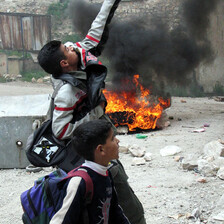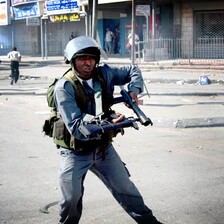The Electronic Intifada 16 December 2003

After the Yoni Ben-Artzi verdict, nobody really expected a “not guilty.” Clearly, they would be found guilty-as-charged of the formal aberration of “not obeying an order”, but against our better judgement we were hoping that these boys’ convincing moral stand did impress the court. But the Colonel Avi Levy who read the verdict seemed a different person from the presiding judge who had exhibited signs of moderation throughout the earlier sessions.
While starting out by accepting the defence’s contention that the Freedom of Conscience is a right under Israeli basic law and not just a privilege granted at the army’s pleasure, the verdict proceeded to give it such an interpretation as to nullify its practical value. In essence, the verdict endorsed the military authority’s policy and the judicial justifications for it as presented by the prosecution: exemption from military service should be granted only to pacifists and nobody else. The judge seemed less concerned with the ideological differences and more with practical ones: pacifists in his view are a small group which does not challenge government policies but just seek personal salvation and, so he stated, are not likely to grow significantly.
But what the court dealt with here was far more serious: “We recognize that the accused do feel moral and ideological revulsion about taking part in an army which according to their belief is perpetrating manifestly immoral acts. But the act of refusal is derived not only from this revulsion but also - and perhaps mainly - from the wish of the accused to change public opinion in general, to effect a change in the views and in the behavior of those who are about to go into the army and of conscripts and reservists, and finally to cause a change in government policy and bring about an end to the occupation.”
Colonel Levy went into long and complicated legal as well as philosophical arguments reaffirming over and over again that this was a threat not to be tolerated, and that everybody must be made to go into the army and share equally the risk to life in defence of the country (no mention of the tens of thousands ultra-Orthodox who don’t risk their lives while receiving generous allowances for studying in religious seminaries). “There exists no legally established alternative civilian service in Israel, so the military authorities cannot be blamed for failing to offer one as an alternative to the five accused. But it is the position of this court that even if it existed, it would not have provided a fitting answer for the case of these five. The requirement of equality is not that citizens just give three years of service, but that they all undergo the same risk to life” (skipping over the fact that most soldiers in a modern army are non-combatants…).
As the reading ended, we sat there in stunned silence. Only Reuven Kaminer, grandfather of Matan, got up and left the court shouting “Shame!” But outside the court there was the solid phalanx of press photographers and TV cameras, and behind them the activists who had not been able to enter. When the five emerged they got a hero’s welcome of wild cheers and prolonged clapping. Then there developed a scene surely unequaled in the decades that this building has been used as a military court; something halfway between a political rally and a press conference.
The chanting “Occupation is Terror - the Refuser is a Hero” and “Peace Yes - Occupation No” (some cried out “army no”) lasted several minutes, until the TV crews managed to get the quiet to interview the five, their parents and their lawyer.
“We are being punished for saying the word o-c-c-u-p-a-t-i-o-n. So here I say it again: occupation, occupation, occupation” said Matan Kaminer. “The most easy thing for an 18-year old in this country is to get an exemption from the army through all kind of backhand tricks. Anybody can do it, and many do. We chose to go the hard way. We say that the occupation is a moral abomination which moral people can not tolerate and that this is the reason that we refuse to enlist. If our sincerity means that we will sit many years in prison then we will sit many years in prison.”
“We say a truth that most of the public does not know, and that many choose not to know, and that’s why we are being punished” said Haggai Matar. “They do war crimes and they expect us to keep silent. But we will not be silent. We will speak out against the occupation, even when we pay a price. After an exhausting year we find that the military court is not willing to listen to what we have to say. It turns out that Colonel Avi Levy is after all not more than a screw in the military machine. He is not the kind of person to shake the whole system.”
“The worse the occupation becomes, the more people will refuse.” These words of Adam Maor were to go into the evening TV news of Channel-I. He went on to say: “A country which oppresses three and half million people and denies them the most basic human rights is a country which is bound also to oppress its own citizens. No wonder that this country is sending us to prison. No wonder that it is trampling the poor and the disadvantaged, as it does.”
Shimri Tzameret was next: “I am not deterred by this verdict. This court is part of the army, and the army is doing terrible and immoral things such as sending my friends to risk their life for Netzarim settlement and for Hebron, when everybody knows that eventually we will evacuate these places. The army is causing despair in the Palestinian society. In fact it is the army which is breeding the suicide bombers. This is the kind of army it is, and it is no surprise that this is the verdict handed by the court of this army.”
Last of the five was Noam Bahat: “It is important to remember that the war going on now is a war of choice, a war which is not needed for survival or self-defence. A war of choice is by definition immoral. We must refuse because this war will end only when people stop supporting it. I can’t say that I am happy with this verdict, but it is in no way a reason for me or the others to give up.”
“I have listened most carefully to this verdict” said adv. Dov Chenin. “The test of whether a basic civil or human right is being respected is not when everybody agrees. The test is exactly when it is hotly controversial. The court said that the Freedom of Conscience is protected by Israeli law, but it refuses to apply it where it is most needed. If people like these five don’t get the protection of the Freedom of Conscience, then this freedom doesn’t exist. About this I have a strong debate with the court. This right was not given the weight it deserves, which in my view makes the verdict unconstitutional.” (This was perhaps the first draft of an appeal to the Supreme Court.)
Meanwhile, the last act of this court is still to come: next Tuesday (Dec. 23) at 2pm, the court is to hear the arguments of the prosecution and defence as to the fitting punishment, which is expected on that same day.
The information reached us that solidarity demonstrations for The Five took place today in London, Rome and Berlin, and that in France over thousand signatures were collected on a petition initiated by veterans who had themselves served prison terms for refusing to take part in the Algerian War.
For more information: Adv. Dov Chenin +972-3-5256333 / +972-68-249212; Anat Matar +972-3-5408977 / +972-58-560001 Messages of support to: Noam.Kaminer@exlibris.co.il.
Hebrew readers can follow the “Prison Blog” of Shimri.
Adam Keller is a member of Gush Shalom. He wrote this report on behalf of the Refuser Parents’ Forum.



